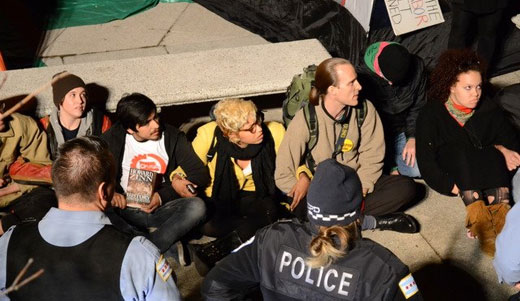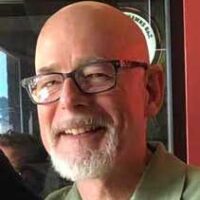
CHICAGO — On Saturday Oct. 15, I was one of the 200 occupiers who were arrested standing up for free speech and assembly and against corporate greed, after Occupy Chicago attempted to establish an encampment at the edge of Grant Park.
For nearly a month this movement has been occupying the corner of Jackson and LaSalle streets in the heart of the city’s financial district. However, city ordinances make it impossible to stay overnight there so protesters sleep in a nearby church.
Under a crisp cool night sky a spirited march of 4,000 strong marched from the financial district to Grant Park. As waves streamed into the pavilion at the corner of Michigan and Congress, a giant American flag was lofted and passed over the heads of protesters.
While tents were being set up an impromptu rally took place. It began with the prescient but eerie audio clip of Charlie Chaplin who played the Jewish barber in his 1940 film, “The Great Dictator,” the first major feature film of its period to bitterly satirize Nazism and Adolf Hitler.
“You, the people have the power – the power to create machines. The power to create happiness! You, the people, have the power to make this life free and beautiful, to make this life a wonderful adventure,” the recording crackled over the park.
“Then, in the name of democracy, let us use that power! Let us all unite! … Let us fight to free the world, to do away with national barriers, to do away with greed, with hate and intolerance. Let us fight for a world of reason, a world where science and progress will lead to all men’s happiness.”
First to address the crowd was Armando Robles, President of UE Local 1110 and a leader of the four-day Republic Windows and Doors occupation in 2008 . Then greetings were delivered from labor and community groups including the Chicago Teachers Union, Teamsters, Steelworkers, immigrant’s rights and peace activists and the Communist Party.
Many blasted Wall Street and the banks for ruining the lives of millions and corrupting democracy. They spoke proudly of the new movement sweeping the country and how they were determined to take a stand.
The Chicago Police Department surrounded the protest with officers and, at 11 p.m., announced we were in violation of a city ordinance that prohibits being in the park after hours.
Awaiting arrest, the mood among the overwhelmingly young protesters was defiant and festive. At times the crowd sang in unison, including labor and folk songs. Everyone seemed to know the words to Woody Guthrie’s “This Land is Your Land.”
Protesters linked arms and ringed the tents. At 1:30 a.m., after repeated warnings, the police began to arrest us and tear down the hastily constructed tent village. Everyone remained calm, strengthened by the understanding we were going to jail for a worthy cause.
While the arrests were taking place we began singing the National Anthem. It reminded me of the Madison, Wis., protests earlier this year where I witnessed 5000 people sing the National Anthem in the capitol rotunda.
It was an electrifying moment in both places and enough to bring tears to your eyes. The message was clear – we love our country and refuse to allow it to be ruined. This was real patriotism on display, fighting for a real people’s democracy and reclaiming the American Dream.
I’ll never forget the look in the eyes of one young woman as an officer asked her if she was ready for arrest. “Yes, she said serenely. “Please arrest me.” Her eyes sparkled with fearlessness and purpose.
The police separated men and women and filled a Chicago transit bus with men. We were all taken to the police station at 18th and State.
As I was being processed, an officer asked why a “boomer” like me was protesting. I told him, “I’m here to end corporate greed and make the country better.”
“You’re going to have to end capitalism to do that,” he said. I nodded and replied, “If that’s what it takes.”
Another African American officer sympathized with the protest. “If it weren’t for the 1960’s I wouldn’t be here today,” he said.
We were led past holding cells crammed with protesters. A loud cheer and raised fists greeted everyone who passed.
I was placed in Holding Cell C and welcomed by the 25 others there. At 55 years old I was by far the old man of the cell. Most were in their twenties and thirties.
After a short while we settled in for the rest of the night and got talking. Someone began by giving the clearest explanation I have heard of what a “derivative” is, how Wall Street “gambling” crashed the economy and then how the victims were blamed. Sometimes the best education takes place in a jail cell!
Then we got to introductions. Everyone listened respectfully as we told our stories of what we did and what brought us to Occupy Chicago. There were young factory workers, students, a professor, an aspiring comic and union members from Unite Here, SEIU and the Teamsters.
This was the first civil disobedience arrest for most and for some it was their first participation in an Occupy Chicago protest. All spoke eloquently about how corporate greed had impacted their lives.
Our discussions were far ranging. Toward morning we discussed how to diversify the movement and debated whether the Occupy Chicago movement should consider police part of the 99% or just an arm of the state.
The mood throughout the night was joyous, born of solidarity in battle. I can only imagine what it must have been like during the Civil Rights movement when thousands “gladly went to jail” for freedom.
Finally, after being fingerprinted, issued I-bonds (someone joked it was a new Apple product) and assigned a court date, we gathered our belongings and were released. We exited the police station into a dreary Sunday morning rain only to be warmed by a cheering crowd who had waited all night for our release.
There’s not one of us who wouldn’t do it again, and most likely we will, to end corporate greed and make our country right.
Photo: From Occupy Chicago facebook page.

MOST POPULAR TODAY

High Court essentially bans demonstrations, freedom of assembly in Deep South

UN warns that Israel is still blocking humanitarian aid to Gaza

Resource wars rage in eastern Congo, but U.S. capitalism only sees investment opportunity


U.S. imperialism’s ‘ironclad’ support for Israel increases fascist danger at home






Comments